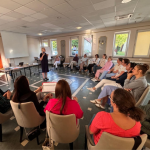Wyniki wyszukiwania dla
The PISOP Center Association was established in the year 2000. We are an independent and non-governmental organization guided by the principles of honesty and partnership. We believe in the importance and strength of citizens' initiatives, NGOs and social enterprises. Therefore, we support them at every stage of their work by offering advice, information, training and innovative solutions. We cooperate with authorities, companies and universities. In short, we drive social action!
We are a member of the Non-Governmental Organizations Supporting Network (SPLOT), a nationwide federation, together with whom we initiate and support the development of civil society in Poland. We participate in numerous consultative and advisory boards related to public policies in Poland and the European Union as well as sustainable development policies of companies.
We have experience in transnational cooperation and projects, using European Union Funds and EEA Grants. The chair of our board worked for 4 years (2016-2019) in the ESF Thematic Network on Partnership for the European Commission.
We are looking for a partner for projects in these areas:
- Cooperation between NGOs and universities.
- Management of NGOs (strategical, financial, human resources, communication, public relations)
- Supporting informal groups of people to work better together
- NGO – government (local government) cooperation
- Business sector and voluntary sector cooperation based on ESG[1] /CSR[2] .
The role of a potential partner is to share experience, to design and to implement some tools we will work on in topics mentioned above.
We plan to finance those projects by European Union funds (different levels) and EEA Grants.
Our activity is focused on 3 areas
1. EMPOWERING CIVIC ENGAGEMENT
Since 2000 we have been supporting the development of local communities, encouraging citizens to create NGOs and implementing actions to tackle social issues and meet social needs. We search for leaders and then we support them in building their team, fundraising and working effectively. We initiate neighbourhood initiatives as well as local partnerships and we encourage volunteering. Furthermore, we help in setting up opinion-making bodies for local lawmaking, e.g. senior councils, youth councils and public benefit councils. We award microgrants for local initiatives.
Recipients: NGOs, informal groups, local leaders
Partners: the SPLOT network, Poznań City Hall, Caritas of Poznań Archdiocese, local NGO centres, Social Assistance Centres, local leaders.
Key successes:
- Networking and supporting over 100 local leaders
- Organizing 27 editions of microgrant programme, through which we co-financed over one thousand initiatives for a total of more than €1 million
- Co-creating a network of Local Initiatives Centres with Poznan City Hall based on the principle of self-help
- Helping to establish about 400 NGOs
- Organizing about 100 educational initiatives for NGOs per year (meetings, training, webinars, etc.)
- Creating tools facilitating the work of NGOs, e.g. fundraising planner, guidelines for increasing information accessibility for people with disabilities
- Helping to establish about 20 public benefit councils, senior councils and youth councils
2. DEVELOPING SOCIAL ENTREPRENEURSHIP
Since 2005 we have been helping with creating social enterprises, and we have been supporting their development by advising in the following aspects: building local partnerships, management, law, finance, accounting, marketing, human resources, and sustainability on the market. We promote social entrepreneurship by including it in public policies and company strategies. We take part in the discussion on volunteering and the work of university students in NGOs and we help individuals to find jobs in the civic sector.
Recipients: social enterprises, groups, institutions and organizations interested in creating social enterprises, students
Partners: Marshal Office of the Wielkopolska Region, the City Hall of Leszno and other municipalities, social enterprises, universities.
Key successes:
- Creating over 250 jobs in 60 social enterprises (co-financing them with €2 million for development)
- Social and work-related support for about 300 people at risk of social exclusion
- Getting accredited by the Ministry of Family and Social Policy for running the Social Economy Support Center
- Creating a BINGO model for managing NGOs and social enterprises
- Developing a social franchise model
- Introducing social clauses in about 20 public tasks
- Developing and implementing company mentoring guidelines for social enterprises
3. PROMOTING COOPERATION
Since 2000 we have been cooperating with local, regional and national public administration bodies for creating laws related to civic engagement, commissioning public tasks and their implementation, evaluation as well as creating spaces for social activity. Since 2007 have also been cooperating with the business sector, particularly in the area of corporate social responsibility in terms of social engagement, employee volunteering and partnering with NGOs. Since 2011, we have been publishing an opinion-forming magazine As Biznesu (Ace of Business) about corporate social responsibility. We facilitate cooperation among social entities .
Recipients: NGOs, social enterprises, public administration bodies, enterprises
Partners: SPLOT network, public administration bodies, enterprises, socio-economic partners, federations, media and others
Key successes:
- Developing solutions for improving cross-sectoral cooperation, including a catalogue of public tasks outcomes, developing procedures for bids assessment in public administration bodies, creating a uniform procedure for announcing grant programs financed from the public budget, creating employee volunteering guidelines for companies
- Establishing the Proxies Forum for cooperation between public administration bodies and NGOs
- Implementing the standards of cooperation between NGOs and public administration in several municipalities
- Developing and implementing a model of social consultation with Leszno City Hall
- Developing and implementing a model of social services contracting with Konin City Hall
- Contribution in developing the first program of cooperation with NGOs for the Ministry of Economy
- Participation in about 10 advisory and opinion boards of public administration and companies
- Cooperation with about 30 companies
- Publishing 30 issues of As Biznesu (Ace of Business) magazine
- Organizing about 70 meetings for companies and public administration bodies
- Training for 60 CSR Managers
- Participation in consultations of about 100 strategic documents for the civic sector development regarding social entrepreneurship, cooperation between public administration bodies and NGOs as well as European Union funds
Expert in civic engagement, NGO management, cross-sectoral cooperation, corporate social responsibility and funds for social activities.
Manager, evaluation and audit specialist; currently writing a PhD dissertation on social enterprise management at the University of Economics in Poznań.
Author and coordinator of dozens of projects, including a few innovative ones, related to the development of social organizations and civic engagement. An experienced trainer, coach, mentor and supervisor. Expert project assessor in grant programs and an assessors trainer.
Editor-in-chief and co-author of many publications regarding NGO and social enterprises management, evaluation, EU funds and mentoring. Editor-in-chief of opinion-forming magazine As Biznesu (Ace of Business) on corporate social responsibility. Member of numerous advisory and opinion bodies at the European Union, national, regional and local levels. Fascinated with exploring other cultures and traditions, not only European.
[1] ESG stands for
Environmental, Social and Corporate Governance. These three broad areas can
provide a range of targets for a business to meet in order to improve its
sustainability and lower its risk level across various factors. They include
aspects like inclusion and diversity, climate change, human rights and more
[2] Corporate Social Responsibility (CSR) refers to the business policy of making positive contributions to social causes. These could include the environment, the community, the wider economy, the health and wellbeing of staff or any other similar topic.




